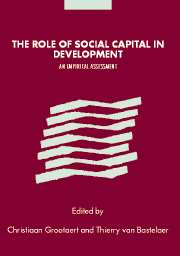Book contents
- Frontmatter
- Contents
- List of figures and maps
- List of tables
- List of boxes
- Notes on contributors
- Acknowledgments
- Foreword by Robert D. Putnam
- Introduction and overview
- Part 1 Social capital at the micro and macro levels: a conceptual discussion and review
- Part 2 The impact of social capital on development
- Part 3 The creation and transformation of social capital
- 7 The impact of development assistance on social capital: evidence from Kenya
- 8 Induced social capital and federations of the rural poor in the Andes
- 9 Social capital and social cohesion: case studies from Cambodia and Rwanda
- 10 Ethnicity, capital formation, and conflict: evidence from Africa
- Conclusion: measuring impact and drawing policy implications
- Index
- References
10 - Ethnicity, capital formation, and conflict: evidence from Africa
Published online by Cambridge University Press: 22 September 2009
- Frontmatter
- Contents
- List of figures and maps
- List of tables
- List of boxes
- Notes on contributors
- Acknowledgments
- Foreword by Robert D. Putnam
- Introduction and overview
- Part 1 Social capital at the micro and macro levels: a conceptual discussion and review
- Part 2 The impact of social capital on development
- Part 3 The creation and transformation of social capital
- 7 The impact of development assistance on social capital: evidence from Kenya
- 8 Induced social capital and federations of the rural poor in the Andes
- 9 Social capital and social cohesion: case studies from Cambodia and Rwanda
- 10 Ethnicity, capital formation, and conflict: evidence from Africa
- Conclusion: measuring impact and drawing policy implications
- Index
- References
Summary
Ethnicity plays an ambiguous role in the great transformation from societies that are rural and agrarian to those that are urban and industrial. On the one hand, ethnicity creates: by providing incentives that organize the flow of resources across generations, it provides the capital for urban migration and the acquisition of skills for industrial employment. On the other hand, ethnicity destroys: ethnic conflict leads to costly acts of violence. On the one hand, ethnic groups promote the forces of modernization; phrased more fashionably, they constitute a form of social capital (Coleman 1990; Putnam 1993). By promoting urban migration and education, they advance the private fortunes of their members. On the other hand, ethnic groups organize politically; occasionally they engage in acts of violence (as illustrated in chapter 9), destroying wealth and discouraging the formation of capital. Ethnic groups can thus both generate benefits and inflict costs on societies.
In advancing this first theme, this chapter advances a second: that the political dangers of ethnicity are imperfectly understood. Every modern industrial country contains urban centers in which politics are organized in significant part by ethnic groups. In the modern world, ethnic politics are normal politics. This being the case, ethnicity need not, in general, be feared. Clearly, however, ethnic rivalries can fuel political violence. To understand fully the significance of ethnicity, it is therefore important to identify the conditions under which ethnic competition can lead to political conflict.
- Type
- Chapter
- Information
- The Role of Social Capital in DevelopmentAn Empirical Assessment, pp. 310 - 340Publisher: Cambridge University PressPrint publication year: 2002
References
- 6
- Cited by

